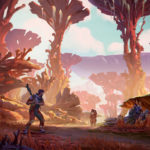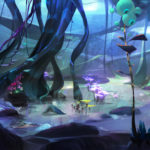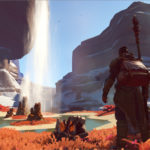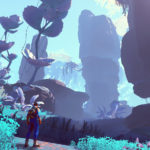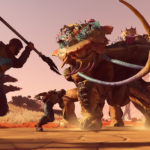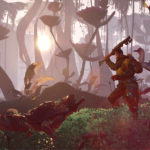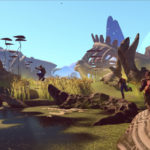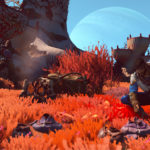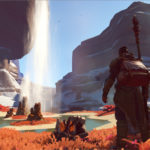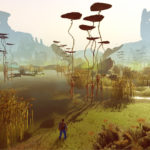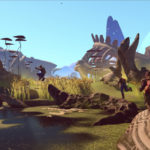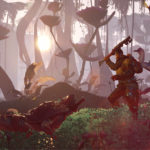
Survival MMORPG Population Zero is officially launching on Steam in early May, Enplex Games announced today. As part of the reveal, the studio’s also altered the game’s planned business model, declaring that it’ll be buy-to-play instead of free-to-play, with a base buy-in of $29.99, chiefly in an effort to avoid pay-to-win mechanics.
“From the beginning, Population Zero has been focused on narrative-driven survival in a harsh alien environment. The main plot with various side quests and numerous non-playable characters eager to shed light on Kepler’s mysteries have attracted fans of classic sci-fi. But a clear goal for players other than ‘survive’ was always missing. In order to make life on Kepler have purpose, Enplex Games is adding a ‘win condition’ which binds the story and survival mechanics together. When players log in this May, they’ll now have seven days to survive and prosper before Kepler becomes unlivable and the survivors’ DNA is changed irreversibly. The players’ goal becomes about constructing a safe haven before this cycle occurs, and each seven days, players will have to restart their adventures on Kepler, bringing with them not only the knowledge of their past lives, but also other account-based progression rewards. As cycles come and go, Enplex will add new mysteries, new mechanics, and new regions to be discovered.”
Ahead of the formal announcement today, we had opportunity to chat with the devs about their plans for the game, its monetization, its PvP plans, and even its philosophy. Read on for the whole scoop!
MassivelyOP: So you folks are gearing up for launch – what are the testing phases we can expect between now and then? Will there be any phases where players can test without buying in to the game?
Enplex Games: We had many tests last year, those helped us immensely. Right now we are close to the finish line, and that’s why we want to concentrate on development and polishing, but we are still planning to run a series of playtests. A series of in-house focus tests, where we invite our core community and new players to join us for a 3-hour long session at our HQ, as well as external tests. You can also try the game at PAX East. We’ll have a booth there – 13074 – right by ArenaNet and Nintendo!
Let’s talk about monetization. Up until now, you were planning a free-to-play model, but you came to the determination that the game was becoming too, well, pay-to-win. So you’ve converted to a buy-to-play model and will launch on Steam. Are you still planning a cash shop? Will there be any sort of free trial or demo mode for players who want to check it out without dropping cash?
All future pieces of DLC – expansions and cosmetics – will be sold via Steam. It’s our only platform of distribution as of right now. We are planning to run several play tests for those who already have the game – our Founders – and for the users who preorder Population Zero on Steam. We will inform the players about such tests in advance. We are showing the game at PAX later this month, so we invite players to our booth for a chat and a quick game session.

Adding to that, what about future content – will it likewise incur a fee? How much post-launch DLC might we expect – how far into the future does the roadmap for content expand? How will the game be supported post-launch, and how successful does it have to be to keep that support going?
We are aiming at a long post-release support because we want Kepler to become a truly living-breathing world that can (and should) undergo changes. We already have plans for future expansions, new mechanics, locations and lore. We will be able to share our roadmap shortly after Steam launch and we plan to stay in touch with our community daily via Discord and other social platforms and do weekly developer updates. At the moment we plan DLCs as paid stand-alone packages, as well as free content that comes with patches. That way we can support the studio as well as satisfy our players.
We’ve seen some other games that blend MMO and survival elements, like Atlas and the now-defunct Rend, fail to gain a foothold in the market at all, let alone with one type of player or the other. And yet PZ is definitely straddling the survival MMO line; the gameworld and character development lean more toward MMOs, while you’ve got an elaborate needs system for things like environmental hazards and hunger, plucked straight from survival games. So what exactly is PZ doing differently to avoid the “hybrid MMO” curse of appealing to neither side?
When we describe our game like a hybrid of MMO and Survival we mean that it’s more than just a sum of its parts. The game’s very harmonic, coherent, unrestrictive. Personally, I would call it a story-driven space pioneer simulation game but that’s a mouthful, and it doesn’t include our most important addition – the timed aspect of survival. Players will have only 7 real days (or 168 hours if you’d like) to complete the storyline. Session-based approach adds urgency, excitement and tension to Population Zero. It’s not survival for the sake of survival mechanics. We give players a clear objective – make it in time or die trying.
I wouldn’t say that our character development gravitates towards MMOs, either. There is no character leveling system. Instead we offer Perks and a Tech-tree. The former are tweaks to current character builds that help develop colonists in unique ways. The latter is a deeper, more strict and demanding system that determines the course of character development. Perks are awarded for doing different activities, like slaying beasts, mining resources, doing quests, and players never know what bonus they will get with a new perk.There is always an element of surprise here. On the other side, Technology gives a clear map of skills which are dependent on one another.

PvP has been such a huge issue for the MMO community lately, especially with New World toning down its system to thwart the griefing it saw in alpha, and now it sounds as if you folks are taking some of those lessons to heart – you’re keeping PvP, but you’ve added a newbie area and have lessened the penalties for dying. Can you discuss how the test phases up to now have led you to make those calls? Might you tamp down on the griefing even more between now and launch?
If you look closer at every major Survival game coming out this year, each one of them will have PvP tamed down in one way or another. One can even view this as a way of dealing with different displays of toxicity, or cyberbullying in general. I believe that we have found the sweet spot between extreme, hardcore conditions and casual, newcomer-friendly approach, and as of now there are no plans to lean towards either of the poles. We are holding the middle ground. That said, our account progression system will allow drastic gameplay modifications: shortened session duration, full loot drop, aggressive AI behaviour. The higher the account level the more modes and modifiers will be available to the player. This will serve as an incentive to return to Population Zero time and again. Besides, players will be rewarded more account experience points for playing such game modes.
One last question – there’s so much Russophobia in the media and culture right now, tech especially, which has to be a source of endless frustration for legitimate game developers from the country who are just like devs everywhere and just want to build games. I’m curious if you guys are willing to comment on what that’s like from your perspective in Moscow, how much of it you deal with in the genre, how you deal with it, and whether you’re hoping to change perceptions with the games you’re bringing westward.
We feel that anti-Russian prejudice is only felt on the political level. However, when it comes down to interpersonal communication and business relationships the hysteria disappears entirely. Our partnership with Team Critical Hit [Enplex’s PR firm here in the US] is a living example of that. We have friends, acquaintances and colleagues in North America and Europe, and for the last couple of months we’ve been talking more about the lack of snow this winter here, in Scandinavia and Eastern Europe rather than politics.
As for the gaming industry, it is even simpler. The gaming industry and community are like a multicultural amusement park, it’s super fun and incredibly diverse. Video games do not and should not depend on age, race, gender, political agenda, taste in food, level of education or blood type. Video game worlds are attracting huge numbers of people of different origin, mentality and physical appearance. And we hope Kepler will be one of such worlds.
Hear, hear! We’d like to thank Enplex Games for tackling our questions! You can add the game to your wishlist on Steam right now.


